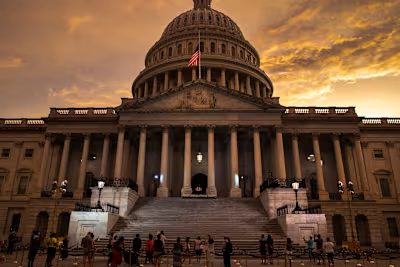U.S. government censorship in the digital age

After then-President Donald Trump called singer John Legend “boring” and referred to Chrissy Teigen as Legend’s “filthy mouthed wife” on Twitter, Teigen responded by Tweeting that Trump was a “pussy ass bitch.” This remark prompted the White House to ask for the Tweet’s removal, according to an ex-Twitter employee who testified before Congress.
That’s just one example of a larger trend of American lawmakers toying with the idea of censorship in the digital age. Meanwhile, the concept of content moderation on online platforms has gained popularity and has been the subject of much public discourse, especially among Gen Z.
The Case for a Hands-Off Web
American teens value feeling safe online more than being able to speak freely, according to a 2022 poll from Pew Research. Additionally, teens value a “welcoming, safe online environment,” while adults over 18 were split.
Part of the poll’s results came when there were “bipartisan calls for tech companies to address cyberbullying and create a safe environment for teens,” according to Pew Research.
Christopher Finan, Executive Director of the National Coalition Against Censorship, said this trend among Gen Z is due to the nature of the internet itself.
“The internet allows anybody to say anything … it has allowed hate speech, and it has allowed terrorist propaganda,” Finan said. “We’re all exposed to stuff we find appalling. The natural response to that is to demand [the] government do something about it. It’s not surprising, but it’s misguided, because the idea that you can create a world in which there isn’t speech that is hateful just doesn’t exist.”
When it comes to government action for online content, Kevin Goldberg, a First Amendment expert at the Freedom Forum, a nonprofit dedicated to free speech, said it's best to leave the internet alone.
“Internet sites should continue to be allowed to determine for themselves who a ‘customer’ is and isn’t,” Goldberg wrote in an email. “This is what enables the marketplace of ideas online, and while it may seem odd to say that allowing Twitter to ban users or delete individual tweets is good for free speech, that’s far better than having the government tell Twitter who can speak and what can be said.”
Truth Social, TikTok and Censorship
After Trump was banned from Twitter Following the Jan. 6 insurrection, he founded Truth Social, claiming it to be a more free-speech-oriented platform. Yet, a 2022 report from Public Citizen found that the platform’s terms of service were “more restrictive than any other major social media platform,” and the platform has censored topics ranging from abortion to the Jan. 6 insurrection.
Additionally, the report found that Truth Social engaged in censoring users without providing any notice, also known as shadowbanning, and “their content moderation practices lack the transparency, consistency, and nuance expected of a major social media platform.”
There have also been efforts under both the Trump Administration and Congress to ban TikTok in the U.S. In a statement, the American Civil Liberties Union condemned a bill that would effectively ban the platform in the U.S.
“We’re disappointed that the House Foreign Affairs Committee voted to approve a bill that would effectively ban TikTok in the United States, in violation of Americans’ First Amendment rights,” the statement said. “We urge legislators to vote no on this vague, overbroad, and unconstitutional bill.”
Global Free Speech Trends Compared to the U.S.
Overall, global freedom on the internet decreased for 12 consecutive years, according to a 2022 report from Freedom House, a non-profit dedicated to free speech and human rights. The sharpest declines were in Russia, Myanmar, Sudan and Libya, while China was the worst nation for internet censorship for the eighth consecutive year.
Despite censorship and surveillance efforts, overall internet freedom increased in a record 26 countries, including the U.S., according to the Freedom House report. The U.S. is still behind many developed nations.
In a 2022 report from Reporters Without Borders, the U.S. is ranked 44th out of 180 countries for freedom of the press – well below most European countries and several developing democracies. While the report said the U.S. has made modest improvements under the Biden administration, the low score still raises questions on how censorship efforts can be so prevalent despite having such strong free speech protections.
“Paradoxically, free speech protects the right of people to demand censorship. It's just part of what the free the First Amendment commits us to as a nation,” Finan said. “ If you don’t like an idea, fight it, oppose it, build up support for it … but don’t bring government into it, because that’s really the fox in the henhouse.”
There have been widespread protests in Iran despite their comprehensive pro-censorship laws. Michael Chan, a researcher and journalism professor from the Chinese University of Hong Kong, was the lead researcher for a report titled “Government Digital Repression and Political Engagement” that outlines the link between government censorship, surveillance and the media.
“Even though countries like Iran and Saudi Arabia are considered very authoritarian, protests can and will happen,” Chan wrote in an email. “Unless a country shuts down the internet completely, dissidents would find ways to circumvent surveillance and censorship to attain anti-regime news.”
The authors of the study mention that as technology and artificial intelligence get more advanced, the technologies that support censorship will be even more present and effective to “control information flows, monitor citizens, and debilitate democratic engagement.”
The report goes on to say, “This applies not only for authoritarian regimes like China that already have in place sophisticated offline and online government apparatuses for censorship and surveillance, but also liberal democracies as many have followed the example of the United States post-9/11 and put in place more subtle forms of surveillance to monitor citizens’ online activities.”
The post-9/11 surveillance in the U.S. mentioned in the report largely came from the highly controversial Uniting and Strengthening America by Providing Appropriate Tools Required to Intercept and Obstruct Terrorism Act, more commonly known as the U.S.A. PATRIOT Act.
“The PATRIOT Act was this 400-page bill that was passed in six weeks in the panic after 9/11 and included some really very broad language,” said Finan. It effectively gave federal intelligence agencies sweeping authority to surveil citizens without warrants.
Despite censorship and surveillance efforts, internet freedom increased in a record 26 countries, with the United States included, according to the Freedom House report. The uptick in internet freedom in the U.S. was the first improvement in six years, and was the first time it improved since before Former President Trump was sworn in.
The Trump Administration and Censorship of Environmental Data
One notable example of censorship under the Trump administration is related to the removal of environmental information from government websites, according to a 2021 report from the Environmental Data & Governance Initiative, a watchdog group created to monitor censorship of environmental data during the Trump years. During former President Trump’s time in office, his administration made nearly "1,400 changes to federal environmental websites,” according to the report. Half of the monitored changes were related to the removal of public resources from federal websites.
“During his campaign, (Trump) had talked about putting the EPA on the chopping block, and just obviously campaigned on a real deregulatory agenda. We had concerns that environmental governance would shift considerably, particularly on a real deregulatory bend,” Gretchen Gehrke, the lead author of the EDGI report, said.
Actual censorship of environmental data was even more widespread than anticipated, according to Gehrke. “I did not expect that the EPA’s entire climate change website would be removed,” she said.
While the Biden administration has made some efforts to undo this mass-removal of scientific information, Gehrke said it’s not quite enough, and there should be a priority on instating policy that would more effectively protect federal data online.
“The way (Trump) censored so effectively is that he exploited vulnerabilities in information policies,” said Gehrke. There is nothing saying that a political appointee—basically anyone on the chain— can just remove information whenever they want from a website.”
Gonzalez v. Google: a primer
Rising concerns about censorship in America have focused mostly on the executive and legislative branches of both state and federal governments, but some free-speech experts are even more concerned about the the judicial branch, particularly the U.S. Supreme Court, and who a new conservative majority could roll back First Amendment liberties.
Kevin Goldberg, a First Amendment expert at the Freedom Forum, wrote via email that a landmark Supreme Court case involving Section 230 of the Communications Decency Act “could potentially upend modern communication as we know it,” if the Court does not uphold the statute.
The case largely focuses on Section 230(c)(1), which states, “No provider or user of an interactive computer service shall be treated as the publisher or speaker of any information provided by another information content provider." In other words, it provides online platforms such as Google, Facebook and Twitter broad immunity from liability for speech made by users and has been called the “26 words that created the internet,” a phrase cybersecurity expert Jeff Kosseff has often been credited with coining.
The case stems from the 2015 Paris terrorist attack that killed Nohemi Gonzalez, an American student who was studying abroad. Her family is suing Google, claiming the tech giant is at least partially responsible for the attack.
The attack was carried out by ISIS, a group that posted propaganda and recruitment videos to YouTube, which is owned by Google. The Gonzalez family argues that while Google is not responsible just because ISIS used its platform, the powerful algorithms that recommended ISIS recruitment videos to users should not be protected under Section 230, because they claim those algorithms, created by YouTube, should count as content in and of themselves.
The Gonzalez family defended their point by contending that YouTube creates a sharable Uniform Resource Locator (URL,) or web address, for every video on the platform and often creates thumbnails for said videos.
“They’re trying to argue as a technical matter that the creation of URLs and the corresponding thumbnails that those are YouTube’s own content creation that fall outside of 230, and frankly, that is absolutely ridiculous,” said Sophia Cope, a senior staff attorney for the Electronic Frontier Foundation.
Cope said if a platform loses Section 230 immunity because they created a URL, “you’ve basically eviscerated (Section) 230(c)(1) because every single piece of content online has to have a URL.”
Former President Trump, who was publicly opposed to Section 230 during his presidency, has appointed three Justices to the Supreme Court who now make up half of the branch’s six-Justice conservative majority.
Justice Elena Kagan, one of the court’s liberals, spoke on the complexity of the case during a hearing. “Every other industry has to internalize the costs of its conduct. Why is it that the tech industry gets a pass?” Kagan said. “On the other hand, I mean, we’re a court. We really don’t know about these things. These are not, like, the nine greatest experts on the internet.”
The Electronic Frontier Foundation, an organization promoting free speech online, has publicly supported protecting Section 230 in the Gonzalez case. The group, including Cope, wrote and submitted an amicus brief to the Supreme Court, arguing that online platforms “would censor far more user expression if they could be liable based on claims that they ‘promoted or encouraged — or at least tacitly assented to — the illegality of third parties.’”
Christopher Finan, executive director of the National Coalition Against Censorship, is also concerned about weakening or removing Section 230 from federal law. “We're very concerned that, if that ever got repealed, the companies, to protect themselves, would have to engage in very widespread censorship of what gets posted.”
Like this project
Posted May 10, 2023
For this project, I interviewed experts, conducted research and wrote about the impacts of government censorship in the U.S.
Likes
0
Views
10



